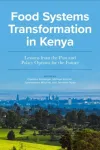(Press-News.org) The past few years have seen Kenya, along with many other countries, confronted with multifaceted and compounding challenges. The disruptions caused by COVID-19, high levels of food price inflation, and environmental crises, such as locust infestations and droughts, have severely tested the resilience of Kenya’s food systems and the affordability of food for its citizens. Against this backdrop of challenges and ongoing demographic shifts, urbanization, and stagnating agricultural production, the need for reexamining the approach to Kenyan food systems has never been more critical.
A new IFPRI book Food Systems Transformation in Kenya: Lessons from the Past and Policy Options for the Future responds to this imperative by bringing together a wealth of empirical research on various aspects of Kenya’s food systems and offering a comprehensive overview of their historical trajectories and possibilities for future evolution. The book, edited by Clemens Breisinger, Michael Keenan, Juneweenex Mbuthia, and Jemimah Njuki, was launched on January 8, 2024, in Nairobi, Kenya, during a hybrid event co-organized by IFPRI, the International Livestock Research Institute (ILRI), Kenya’s Ministry of Agriculture and Livestock Development (MoALD), and the CGIAR Initiative on National Policies and Strategies.
The book takes a critical look at of the whole food system, including:
The current state and drivers of transformation, in particular the country’s livestock sector and projections for its future.
Ways to strengthen Kenyan food systems across several vital dimensions, such as promotion of healthier diets and food safety; enhanced productivity with greater intensification of the maize-based farming and improved access to agricultural inputs and mechanization; greater resilience through more widespread use of climate insurance and risk-contingent credit; improved livelihoods for women, youth, and smallholder farmers; and enhanced sustainability through postharvest management and digital tools.
Clemens Breisinger, the lead editor of the book, commented, “Kenya’s Government’s Bottom-Up Economic Transformation Agenda (BETA) prioritizes food systems, and this book offers actionable strategies aligned with the national goals. Mobilizing funding for food systems transformation is critical as is strengthening the science-policy interface to help Kenya meet the 2030 Sustainable Development Agenda. Despite the important role of the agri-food sector in Kenya’s economy, public expenditure in it remains low, hindering effective policy implementation. We hope that this book will serve as a guiding compass, offering a thorough exploration of the country's food systems and presenting actionable recommendations to support positive change.”
Johan Swinnen, Director General of IFPRI and Managing Director, Systems Transformation, CGIAR, highlighted the diversity of the book’s authors. “Researchers from Kenyan universities and research institutes, IFPRI and CGIAR colleagues, international academics, and experts from multilateral institutions came together to write this comprehensive resource for decision-makers in Kenya.”
The Hon. Mithika Linturi, Cabinet Secretary, Kenya’s Ministry of Agriculture and Livestock Development, noted in the foreword of the book, “We look forward to the Ministry’s continued collaboration with IFPRI, CGIAR, and other partners in creating research-based policy recommendations that will lead to a brighter, healthier future for all Kenyans.”
A free e-version of the book can be downloaded on the IFPRI website; print-on-demand hard copies can be ordered via Amazon.
Citation:
Breisinger, Clemens, ed.; Keenan, Michael, ed.; Mbuthia, Juneweenex, ed.; and Njuki, Jemimah, ed. 2023. Food systems transformation in Kenya: Lessons from the past and policy options for the future. Washington, DC: International Food Policy Research Institute (IFPRI). https://doi.org/10.2499/9780896294561
About the Editors:
Clemens Breisinger is Program Leader for the Kenya Strategy Support Program and a Senior Research Fellow in the Development Strategies and Governance Unit, International Food Policy Research Institute (IFPRI). Michael Keenan is Associate Research Fellow and Juneweenex Mbuthia is a Research Officer in the Development Strategies and Governance Unit, IFPRI. Jemimah Njuki is Chief, Economic Empowerment, UN Women and former Director for Africa, IFPRI.
***
The International Food Policy Research Institute (IFPRI) provides research-based policy solutions to sustainably reduce poverty and end hunger and malnutrition. IFPRI’s strategic research aims to identify and analyze alternative international and country-led strategies and policies for meeting food and nutrition needs in low- and middle-income countries, with particular emphasis on poor and vulnerable groups in those countries, gender equity, and sustainability. It is a research center of CGIAR, a worldwide partnership engaged in agricultural research for development. www.ifpri.org
Media inquiries: Evgeniya Anisimova, e.anisimova@cgiar.org, +1 (202) 627 4394
END
A new book provides a roadmap for food systems transformation in Kenya
2024-01-08
ELSE PRESS RELEASES FROM THIS DATE:
High-quality nursing home dementia care is not only a matter of adding staff
2024-01-08
Irvine, Calif., Jan. 8, 2024 — Additional staffing alone will not be sufficient to bridge the quality-of-care and health outcome disparities among nursing home facilities with varying percentages of residents with dementia, according to a first-of-its-kind study led by the University of California, Irvine. Specialized training, an easy-to-navigate environment and staff stability are also critical to meeting the unique challenges presented by this population.
The findings, recently published online in the journal Health Services Research, indicate that increased staffing generally improves outcomes for all patients but that at any given level of staffing, discrepancies ...
Use of habitat for agricultural purposes puts primate infants at risk
2024-01-08
Frequent visits to oil palm plantations are leading to a sharp increase in mortality rates among infant southern pig-tailed macaques (Macaca nemestrina) in the wild, according to a new study published in Current Biology. In addition to increased risk from predators and human encounters, exposure to harmful agricultural chemicals in this environment may negatively affect infant development.
In wild populations, infant survival is crucial for determining individual fitness and for maintaining viable populations in changing environments. For primates, ...
Clinical research shows AI-enabled digital stethoscope can detect pregnancy-related heart disease
2024-01-08
JACKSONVILLE, Florida — New research from Mayo Clinic suggests that artificial intelligence (AI) could improve the diagnosis of peripartum cardiomyopathy, a potentially life-threatening and treatable condition that weakens the heart muscle of women during pregnancy or in the months after giving birth. Researchers used an AI-enabled digital stethoscope that captures electrocardiogram (ECG) data and heart sounds to identify twice as many cases of peripartum cardiomyopathy ...
Franco-German research funding in the field of biology
2024-01-08
The joint funding program of the French National Research Agency (ANR) and the German Research Foundation (DFG) promotes Franco-German cooperation in the natural sciences, the life sciences, and the engineering sciences. Through this program, Johannes Gutenberg University Mainz (JGU) will receive support for two distinctive projects in the field of biology.
The EVOMET project: Uncovering the evolution of metabolism in plants
Tomatoes, cucumbers, and potatoes taste different due to the accumulation ...
Fastest swimming insect could inspire uncrewed boat designs
2024-01-08
ITHACA, N.Y. – Whirligig beetles, the world’s fastest-swimming insect, achieve surprising speeds by employing a strategy shared by speedy marine mammals and waterfowl, according to a new Cornell University study that rewrites previous explanations of the physics involved.
The centimeter-long beetles can reach a peak acceleration of 100 meters per second and a top velocity of 100 body lengths per second (or one meter per second).
Not only do the results explain the whirligig’s Olympian speeds, but they also offer valuable insights for bio-inspired designers of near-surface water robots and uncrewed boats.
Until ...
Why do we sleep? Researchers propose an answer to this age-old question
2024-01-08
Sleep is a fundamental need, just like food or water. “You’ll die without it,” said Keith Hengen, an assistant professor of biology at Washington University in St. Louis. But what does sleep actually accomplish? For years, the best researchers could say is that sleep reduces sleepiness — hardly a satisfying explanation for a basic requirement of life.
But by melding concepts from the fields of physics and biology, Hengen and a team of Arts & Sciences researchers have constructed a theory that could explain both the meaning of sleep and the complexity of the brain. As reported in a new study published ...
Singh studying distributed computing models and algorithms for pervasive systems
2024-01-08
Gurdip Singh, Divisional Dean, School of Computing, received funding from the National Science Foundation for the project: "EAGER: Distributed Computing Models and Algorithms for Pervasive Systems."
The goal of this project is to extend the traditional graph-based distributed computing models and algorithms to develop a unified model to study cyber-physical systems. The unified models will capture interactions between the physical and cyber entities and the physical phenomena. This project also proposes to develop techniques to design distributed algorithms for fundamental problems ...
Narayanan developing treatments for alphaviruses
2024-01-08
Aarthi Narayanan, Professor, Biology, received funding for the project: "Further the development of Omaveloxolone and Bardoxolone methyl as broadly effective countermeasures against alphaviruses to Support the Battelle Accelerated Therapeutics for Combating Acute Viral Epidemics (BAT-CAVE) Program."
The principal purpose of this program is to conduct Research and Development into medical, pharmaceutical, and diagnostic technologies to enhance mission effectiveness of military personnel, collaborating ...
SwRI awarded $54 million contract to develop QuickSounder weather satellite
2024-01-08
SAN ANTONIO — January 8, 2024 —NASA and NOAA have selected Southwest Research Institute (SwRI) to develop QuickSounder, the first in a new generation of NOAA low-Earth orbit environmental satellites. Under the $54 million contract, SwRI will design and build the satellite and operate it for three years.
QuickSounder will kick off NOAA’s Near Earth Orbit Network (NEON) program. The Near Earth Orbit Network is a collaborative mission between NASA and NOAA. NASA will manage the development and launch of the satellites for NOAA, which will operate them and deliver data to users worldwide. NEON satellites ...
Novel tissue-derived brain organoids could revolutionize brain research
2024-01-08
Press release – Princess Máxima Center for pediatric oncology
EMBARGO: 8 JANUARY 2024 AT 11:00 AM ET (US)
Scientists have developed 3D mini-organs from human fetal brain tissue that self-organize in vitro. These lab-grown organoids open up a brand-new way of studying how the brain develops. They also offer a valuable means to study the development and treatment of diseases related to brain development, including brain tumors.
Scientists use different ways to model the biology of healthy tissue and disease in the lab. These include cell lines, laboratory animals and, since a few years, 3D mini-organs. ...




